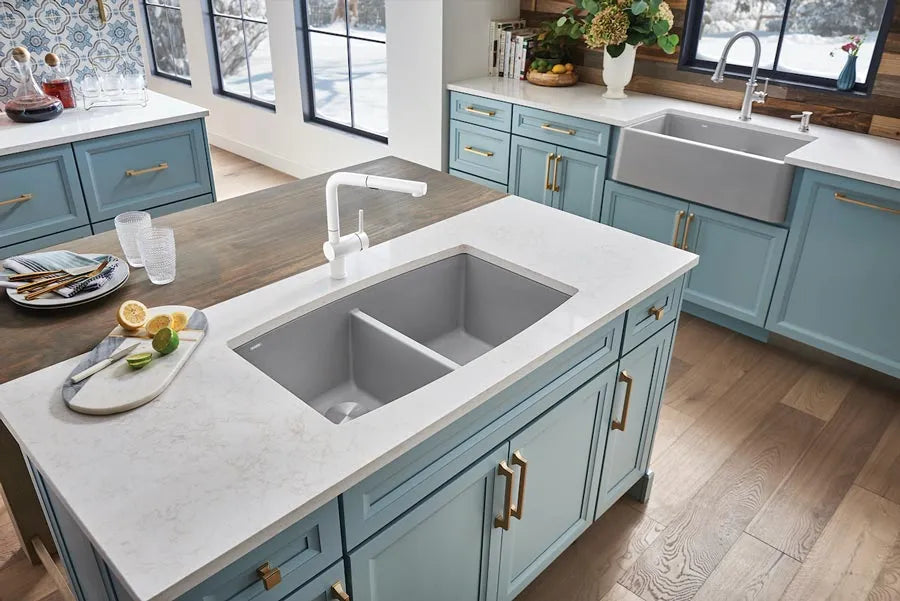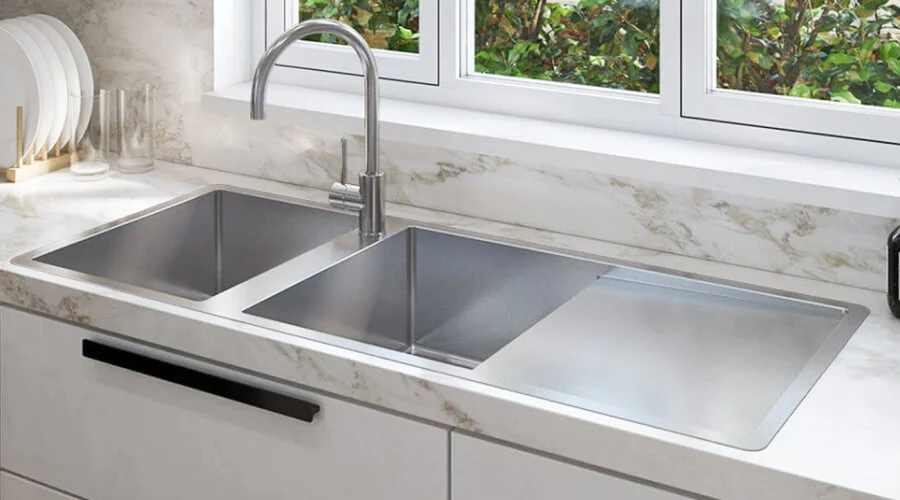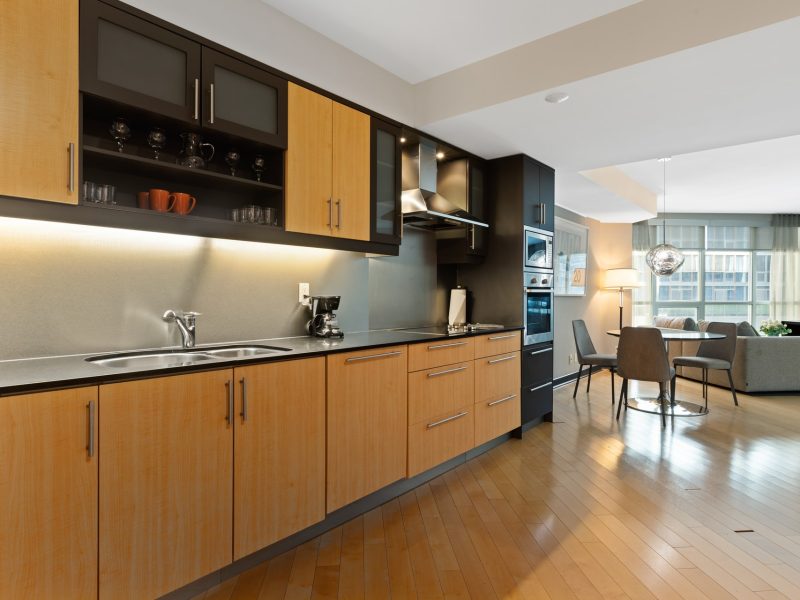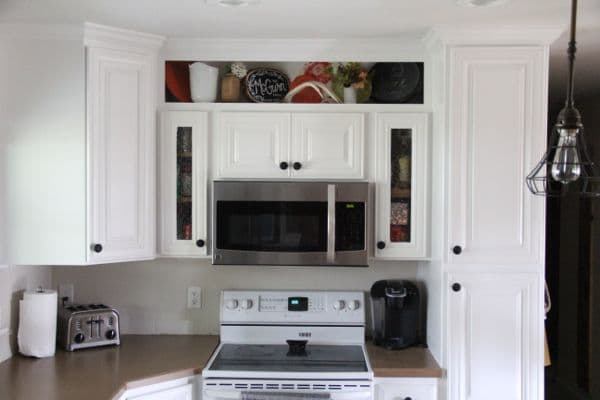When shopping for a kitchen sink, material is a key factor to consider. Each material has its unique advantages and disadvantages, so it’s important to research all of your options before making a decision. Some of the most popular materials for kitchen sinks include stainless steel, porcelain, fireclay, composite, and cast iron. Each of these materials is durable and provides a unique look and feel to the kitchen. Ultimately, the best material for a kitchen sink depends on your personal preference and budget.
Types of Kitchen Sink Materials
When it comes to kitchen sinks, there are several different materials to choose from. Each material has its pros and cons, so it’s important to consider your needs and lifestyle when selecting the best material for your kitchen sink. Here are some of the most popular materials used in kitchen sinks and their benefits:
- Stainless Steel: Stainless steel is a popular choice for kitchen sinks because it’s strong, durable, and easy to clean. It’s also resistant to heat and rust, making it a great option for busy kitchens.
- Granite: Granite kitchen sinks are available in a variety of colors and styles. They’re easy to maintain and have a luxurious look. They’re also heat-resistant, meaning they won’t crack or chip easily.
- Copper: Copper is a naturally antibacterial and highly durable material. It’s also heat-resistant and adds a distinctive touch to any kitchen.
- Cast Iron: Cast iron sinks are a great choice for busy kitchens. They’re extremely durable and can withstand high temperatures. They come in a variety of colors and styles, so you’re sure to find one to fit your kitchen’s aesthetic.
- Fireclay: Fireclay is a strong and durable material that’s easy to maintain and clean. It also comes in a variety of colors and styles, so you can find one that fits your kitchen’s décor.
- Acrylic: Acrylic is a lightweight material that’s easy to clean. It’s also heat-resistant and comes in a variety of colors and styles. It’s a great choice for busy kitchens.
When it comes to selecting the best material for your kitchen sink, it’s important to consider your lifestyle and needs. Each material has its pros and cons, so take your time to weigh your options and make an informed decision. With the right material, you can create a kitchen sink that’s both stylish and functional.
Pros and Cons of Stainless Steel Kitchen Sinks
Kitchen sinks are one of the most important components of any kitchen, and they come in a variety of materials. One of the most popular choices for kitchen sinks is stainless steel, which offers a variety of advantages and disadvantages. To help you decide if stainless steel is the right choice for your kitchen, let’s explore the pros and cons of stainless steel kitchen sinks.
On the plus side, stainless steel is a durable material that does not chip or crack easily. It is also resistant to staining and easy to clean. Additionally, stainless steel kitchen sinks are available in a variety of sizes and shapes, allowing you to find the perfect fit for your kitchen.
However, there are some negatives to consider as well. Stainless steel can be noisy, and it can also dent more easily than other materials. Additionally, it is more expensive than other materials and can be susceptible to scratches.
When selecting a kitchen sink, it is important to take into consideration all of the pros and cons of stainless steel kitchen sinks. While it may not be the right choice for everyone, it can be a great option for those looking for a sturdy, long-lasting, and easy-to-clean sink.
Pros and Cons of Porcelain Kitchen Sinks
Kitchen sinks are essential components of any kitchen, and their material is an important factor in their longevity and performance. Porcelain kitchen sinks are a popular choice due to their attractive look and ease of maintenance. However, there are both advantages and disadvantages to investing in porcelain kitchen sinks.
On the plus side, porcelain kitchen sinks are incredibly durable. They are resistant to scratches, stains, and heat, giving them a long lifespan that makes them a great investment. Porcelain kitchen sinks are also easy to clean and maintain. They can be wiped down with a soft cloth and mild detergent, and they are not prone to discoloration or rust.
On the downside, porcelain kitchen sinks are heavier than other sink materials and can be difficult to install. They can also break if dropped, and they can be more expensive than other materials. Additionally, porcelain kitchen sinks may not be the best choice for those who want a modern or stylish look.
When considering what material is best for kitchen sinks, porcelain is a great choice for its durability, ease of maintenance, and attractive look. However, it’s important to weigh the pros and cons of this material before making a decision. Keep in mind that porcelain kitchen sinks are heavy, can be difficult to install, and may not be the best choice if you’re looking for a modern look.

Image source: https://vevano.com
Pros and Cons of Copper Kitchen Sinks
When it comes to kitchen sinks, copper is one of the most popular materials. Copper is a great choice for kitchen sinks because it is durable, attractive, and easy to maintain. It is also resistant to bacteria, corrosion, and staining, making it a great choice for a kitchen sink. However, copper kitchen sinks come with pros and cons.
On the plus side, copper kitchen sinks are attractive and can instantly upgrade the look of your kitchen. Copper is a natural material and is available in a variety of colors, styles, and finishes, so it is easy to find a sink that will fit your kitchen’s aesthetic. The material is also relatively easy to maintain. Copper is naturally resistant to bacteria and corrosion, and it doesn’t require a lot of cleaning. Additionally, copper is a very durable material, meaning it will last you for many years.
On the downside, copper kitchen sinks can be expensive. Copper is a precious metal, so it can be expensive to purchase. Additionally, copper can develop a greenish hue over time, which can be unsightly in some kitchens. Finally, copper is a soft metal, so it is susceptible to dents and scratches.
In conclusion, copper kitchen sinks are a great choice for many kitchens. They provide durability, beauty, and easy maintenance. However, they can be expensive, and they may develop a greenish hue over time. Weigh the pros and cons of copper kitchen sinks carefully when making your decision.
Pros and Cons of Granite Composite Kitchen Sinks
Granite composite kitchen sinks are a popular choice for kitchen renovations due to their durability and style. Granite composite sinks are made from a mixture of granite and acrylic, giving them a unique look that is both beautiful and resilient. While they are strong and resistant to staining, there are both pros and cons to consider before investing in a granite composite kitchen sink.
One of the major pros of granite composite kitchen sinks is that they are extremely durable. They are resistant to wear and tear and can last a lifetime with proper care. They are also easy to clean and maintain, making them a great choice for busy households. Additionally, granite composite sinks are resistant to staining, so you don’t have to worry about discoloration or other damage caused by food and spills.
However, granite composite kitchen sinks are not without their disadvantages. First, they can be quite expensive when compared to other types of kitchen sinks. Additionally, the material is prone to chipping and cracking, so it is important to take extra care when handling and cleaning. Finally, the material is not completely heat-resistant, so it’s important to be careful when using hot pots and pans.
Overall, granite composite kitchen sinks are a great choice for those looking for a durable and stylish sink. They are resistant to wear and tear, easy to clean, and can last a lifetime if properly cared for. However, it is important to consider the cost and potential damage when considering a granite composite kitchen sink.
Pros and Cons of Concrete Kitchen Sinks
When it comes to kitchen sinks, concrete is a popular material choice for homeowners and designers alike. Concrete kitchen sinks are durable and long-lasting, and they come in a variety of styles and colors to suit any kitchen design. However, like any material, concrete kitchen sinks have their pros and cons. Understanding the advantages and disadvantages of concrete kitchen sinks can help you make the best decision for your home.
The biggest benefit of concrete kitchen sinks is their durability. Concrete is incredibly hard-wearing and can handle daily wear and tear without cracking or chipping. Concrete is also resistant to heat, making it an ideal material for sinks that are near the stove or oven. Furthermore, concrete kitchen sinks come in a variety of colors, textures, and shapes, so you can find one to fit any kitchen aesthetic.
On the other hand, concrete kitchen sinks can be heavy and difficult to install. Furthermore, they can be extremely porous and are susceptible to staining. This means that you must be diligent when it comes to sealing the sink regularly. Additionally, concrete kitchen sinks are more expensive than other materials, and they can be difficult to repair if they become damaged.
For homeowners who are looking for a durable, stylish kitchen sink, concrete kitchen sinks are a great option. However, be sure to weigh the pros and cons of concrete kitchen sinks before deciding if it’s the right choice for your home.
Pros and Cons of Acrylic Kitchen Sinks
When it comes to selecting the best material for a kitchen sink, there are a lot of things to consider. Acrylic kitchen sinks are becoming increasingly popular due to their affordability, ease of installation, and variety of colors and styles. But, like with any type of sink, there are some pros and cons to consider.
The main advantage of acrylic kitchen sinks is that they are incredibly durable and resistant to scratches and other damage. This makes them a great option for busy kitchens. Furthermore, acrylic kitchen sinks are resistant to staining, making maintenance easy. Plus, acrylic kitchen sinks are lightweight and easy to install, which makes them a cost-effective option.
On the other hand, acrylic kitchen sinks are not as heat resistant as other materials, such as stainless steel. Additionally, they can have poor sound insulation, meaning that they can be quite noisy when washing dishes. Also, acrylic kitchen sinks can be prone to discoloration over time, which can be a downside for those looking for a sink that will last for many years.
In conclusion, acrylic kitchen sinks are an affordable and durable option for busy kitchens, but they also have some drawbacks. It is important to weigh up the pros and cons of acrylic kitchen sinks before making a purchase.
When Choosing a Kitchen Sink Material
When choosing the material for your kitchen sink, there are several factors that you should consider. First, you need to think about your budget and how much you can afford to spend. Next, consider the maintenance that is required for the material. Stainless steel is the easiest to maintain, but other materials, such as granite or copper, may require more intensive cleaning and care. Additionally, you should take into account how the sink will fit in with the overall design of your kitchen. If you are going for a classic look, then a solid stainless steel model may be the best choice. Finally, consider the durability of the material. If you are looking for a sink that will last for many years, then you should opt for a material like stainless steel or granite. Ultimately, no matter which material you choose, it should be one that will suit your needs and last for years.
Conclusion
Ultimately, the best material for a kitchen sink is the one that best suits your needs. Stainless steel is a popular choice for its durability and versatility, but other materials like granite, quartz, and copper can also be great options depending on what you are looking for. Consider your budget, lifestyle, and desired aesthetic when choosing the material for your kitchen sink.


